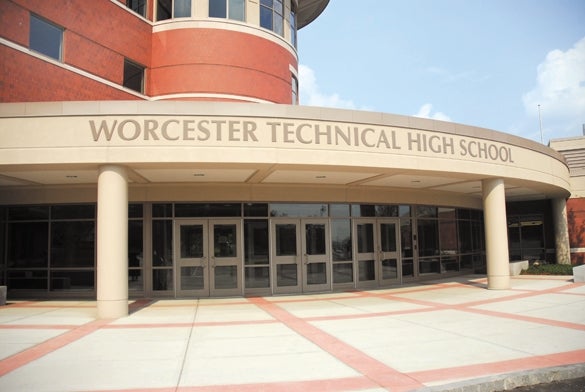With businesses warning of worker shortages and thousands of prospective students stuck on waitlists, lawmakers and advocates urged the Legislature on Tuesday to inject billions of dollars into Massachusetts vocational and technical schools and to reform their admissions policies.
A steady stream of speakers called at an Education Committee hearing for sweeping state action to bulk up the state’s capacity to educate adolescents and adults in high-demand trades and to address inequities that leave some students unable to access life-altering training programs.
An omnibus bill that drew significant support (H 666 / S 348) combines $3 billion in bonding to renovate, expand and construct vocational and technical school buildings with a series of policy changes aimed at accelerating public investment in the field.
“There simply isn’t enough capacity in our system to accommodate the demand for vocational technical education from students, parents and employers,” said Steve Sharek, executive director of the Massachusetts Association of Vocational Administrators. “We don’t have enough regional voc-techs, and the ones we have are often too small and too old. Even some of the newer ones, the most newly renovated ones, were not built to meet the capacity for their regions.”
Rep. Frank Moran, who co-filed the House version of the bill, said the boosted capital infrastructure would help achieve more equitable access to vocational education, in particular for students of color.
“This funding will go a long way to ensure that communities like Lawrence and other Gateway Cities are able to provide top-tier vocational learning opportunities to a student looking to pursue a career in the trades,” Moran, himself a graduate of the Greater Lawrence Technical School, told his colleagues.
In addition to authorizing $3 billion in bonds through the Massachusetts School Building Authority for voc-tech investment, the wide-ranging bill would create a Career Technical Education Funding Commission to study long-term questions about how to pay for expanded skills-based training programs in Massachusetts and would stand up a career technical education office within the Department of Elementary and Secondary Education.
It would also permit long-term leasing of buildings so more schools could offer hands-on training programs and would empower cities and towns to remove vocational school payments from their local tax levy limit, easing budget pressure, according to a summary of the bill from the Alliance for Vocational Technical Education.
Elected officials continue to point to vocational and technical education as a pathway to steady, well-paying jobs for Massachusetts students and for adults seeking career changes. However, demand far outpaces the available space in the state’s schools, and the cost of expanding capacity looms as a major obstacle.
Several speakers warned that inaction will slow the state’s recovery from the pandemic and the economic devastation it wrought.
Nina Hackel, who owns a kitchen and bathroom remodeling company named Dream Kitchens, told the committee that her business could be poised to grow 30 to 40 percent compared to last year but will be unable to do so because “we don’t have enough tradesmen.”
“This is a crying shame,” she said. “The trades are screaming. We need to stop selecting our kids to go into trade school on criteria that mainly help them in college. We need to get our trade schools working on creating trades. We need to actually make this available for the 8,000, maybe 10,000 kids that would like to get in there.”
“Our economy is being ruined because we do not have enough vocational seats to satisfy what we need,” Hackel added.
Education advocates have also been pushing for state action to update admissions policies at the dozens of vocational and technical schools in Massachusetts, in some cases calling for a more forceful response than the regulations the Baker administration has implemented.
A bill from Sen. John Cronin of Lunenburg (S 308) would require all vocational schools to select incoming classes using a lottery, replacing the current system in which students can be admitted based on their grades, attendance, discipline, guidance counselor recommendations and sometimes interviews — all factors that create disproportionate barriers for communities of color.
“We currently have a system of vocational schools that selectively enroll more privileged students, thereby contributing to the state’s wide and persistent gaps by race, income, language and disability in student achievement and high school graduation and dropout rates,” said Dan French, president of Citizens for Public Schools and a member of the Vocational Education Justice Coalition.
A DESE analysis published in February found that Massachusetts had about 1.75 completed student applications for vocational education for every one available program seat. Students of color, those from economically disadvantaged backgrounds, English language learners and students with disabilities “received fewer offers of admission” compared to their peers, the analysis found.
Last month, the state Board of Elementary and Secondary Education approved new regulations for the 2022-2023 school year removing the requirement that grades, attendance, disciplinary records and counselor recommendations be used as vocational-technical admissions criteria.
The regulations empowered Commissioner Jeff Riley to intervene in cases of non-compliance. Riley said he plans “to be very forceful” and may opt to require schools to use a lottery system.
Speaking in favor of the Cronin bill, French said he believes that lawmakers should go even further and mandate a random drawing of students to admit when applications exceed available seats.
“The regulations hand over to vocational schools the responsibility to interpret this standard and still allow them to include grades, discipline, attendance, recommendations and interviews with some restrictions,” he said.

